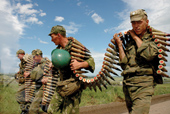EU about to see for itself
By David Matsaberidze
Tuesday, September 23

The Head of the EU Monitoring Mission in Georgia (EUMM), Hansjorg Haber, arrived in Tbilisi over the weekend with a few of its members to prepare for the deployment of at least 200 unarmed observers in the areas adjacent to South Ossetia and Abkhazia, as envisaged by the September 8 agreement between the Russian and French Presidents. Haber held meetings with Prime Minister Lado Gurgenidze and Parliamentary Chairman David Bakradze among others. EUMM, to be headquartered in Tbilisi, has been established for an initial period of twelve months and has a budget of EUR 31 million. The mission will also have field offices, although the locations of these have yet to be determined.
The main task of EUMM will be to monitor, analyze and report on compliance with the six-point ceasefire agreement. EUMM is also tasked with monitoring human rights, troop withdrawal, freedom of movement, civil governance, rule of law, law enforcement structures, security of transport links, the energy infrastructure and the political and security aspects of the return of IDPs. The observers should be in place by no later than October 1.
While Georgia prepares for the arrival of the observers, violations of its citizens continue in the areas where EUMM will operate. On September 22, as a result of a land mine blast in Khurcha, on the border with Abkhazia, two Georgian policemen – Zaza Shonia and Bakur Jiqia – were wounded and urgently operated on at Zugdidi Hospital, the Georgian Interior Ministry says. An exchange of fire had taken place there the day before, initiated and provoked by Russian-Abkhazian formations on the Russian-controlled portion of territory, according to the inhabitants of a nearby village. The Georgian police checkpoint was fired at from the Russian/Abkhazian positions, an action which claimed the life of Georgian police officer Ramaz Kitia and wounded three others.
On the same day, in the village of Zemo Bargebi, in Gali district, 15-year old Irakli Jalagonia was kidnapped. As TV Rustavi2 reported, the kidnappers demanded USD 50,000 from his family in exchange for their son. Reportedly, the Jalagonia family runs a small business. The suspects, who are Abkhaz, found shelter at the Russian checkpoint after the kidnapping, preventing Georgian law enforcement bodies from detaining them. Many local civilians, generally women and children, left the village, but later on September 22 the Akubardia family was detained on the Mestia-Tsalendjikhe highway. The mother was raped and her son taken hostage.
The Russian occupation forces are also still strengthening their positions near Gori. The Russian soldiers at the checkpoint near the village of Variani claim they are preparing for the winter, and it is reported that they intend to erect permanent troop accommodation near the checkpoint. The same is happening at other illegal checkpoints in the Shida Kartli region, where the soldiers claim not to have received directives regarding their departure from the territory, as Rustavi 2 reports.
David Bakradze, Chairman of the Parliament of Georgia, has declared that the incident in Khurcha is part of a willful prolongation of the Russian military occupation. He has told journalists that Georgia will ask the EU to respond appropriately. Russian Prime Minister Vladimir Putin maintains that Russian troops will pull out of the areas adjacent to South Ossetia and Abkhazia after EU monitors are deployed there, as envisaged by the Medvedev-Sarkozy agreement. Russia has removed its five outposts on the line between Poti and Senaki and has to withdraw its remaining troops from the areas outside South Ossetia and Abkhazia within 10 days after EU monitors are deployed there under the terms of that agreement. Putin stressed however that the presence of the Russian armed forces in South Ossetia and Abkhazia will be determined on the basis of agreements between Russia and these “independent states.”
Russian Foreign Minister Sergei Lavrov has said that a total of 7,600 troops will be deployed in Abkhazia and South Ossetia, a force more than twice the size of its existing peacekeeping contingent. The Speaker of the Russian Duma and leader of the Edinaya Rossia party, Boris Gryzlov, visited Tskhinvali on September 22, after first visiting North Ossetia.
The Chairman of the Cabinet of Ministers of the de jure pro-Georgian Government of the Autonomous Republic of Abkhazia, Malkhaz Akishbaia, stressed that by signing diplomatic agreements with the Russian Federation, Abkhazians and South Ossetians will become even more isolated than they were before the Russian-Georgian War. “According to the new agreements, Russia will be granted the right to deploy an unlimited number of troops on the conflict regions of Georgia, making Abkhazians totally dependent on Russians.” With very few exceptions, almost every country on earth has confirmed that it still regards the two new “states” as legally part of Georgia.
The results of the Russian occupation have been discussed at a Council of Europe congress in Strasbourg, which stated that negotiations over the status of Abkhazia and South Ossetia should be opened immediately. The restoration of the authority of the Government of Georgia over these regions was the main topic of discussion. Another special session of the congress will be held on December 2 for discussing this issue in some detail.
